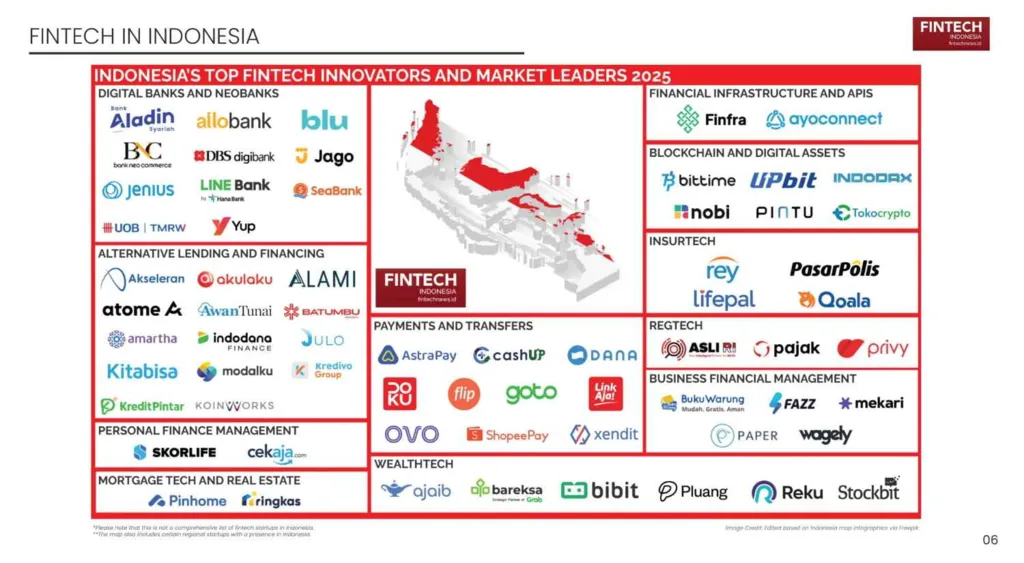Indonesia’s fintech market is entering a powerful new phase. In 2025, Indonesia Fintech Policy Trends show the sector is set to generate more than USD 8.6 billion in revenue, supported by widespread mobile use and digital-first services. Projections show the market could reach USD 11.06 billion by 2033, with a CAGR of 15.47%, confirming Indonesia’s rise as one of Southeast Asia’s fintech leaders.
Growth in Indonesia Fintech Policy Trends

The backbone of Indonesia’s fintech boom lies in digital payments. By 2024, they made up 73.44% of the sector’s total revenue, powered by the QRIS (Quick Response Code Indonesian Standard) expansion. This nationwide system unified payment methods, allowing even micro and small businesses to join the cashless economy. Their fintech adoption is growing at a 9.88% CAGR, marking a sharp inclusion milestone.
Government efforts to standardize QRIS also paid off. Merchant fees dropped, and daily digital transactions surged past 20 trillion by January 2025. These figures make Indonesia one of the fastest adopters of digital payments in Southeast Asia. The transformation is social, linking millions of people to formal financial systems for the first time.
Innovation and the Rise of Neobanking
Beyond payments, neobanking is becoming Indonesia’s next big wave. With a projected CAGR of 10.04% through 2030, digital-only banks are reshaping how Indonesians manage money. These platforms combine savings, payments, and investments in one place, meeting the needs of a connected, mobile-first population.
The trend also reflects how fast consumers are shifting to convenience. Indonesia had 224 million internet users in 2022, and since then, access to mobile financial tools has become mainstream. From city dwellers to rural entrepreneurs, more Indonesians are turning to digital wallets and neobanking apps for everyday transactions.
Read Also: Indonesia Cross-border Fintech Expansion Is Driving ASEAN Change
Regulatory Reforms in Indonesia Fintech Policy Trends
Rapid growth has pushed regulators to act. The Indonesian government’s fintech policies in 2025 show a clear dual focus—promoting innovation while tightening oversight. Licensing rules for new market entrants have become more demanding. Reviews can now take up to 18 months, with pre-launch costs reaching USD 1.8 million.
This stricter process benefits established players that already meet compliance standards, but makes it harder for smaller startups to enter. The goal is to ensure consumer protection and financial stability, but it also means that new entrants must prepare for higher regulatory costs and longer approval cycles.
At the same time, Indonesia is among the first in Southeast Asia to pilot a central bank digital currency (CBDC)—the digital rupiah. This initiative signals a forward-looking approach to blockchain-based settlements. If successful, it could cut cross-border payment costs and make transactions faster and more secure, both for individuals and businesses.
E-commerce and the Expanding Digital Economy
Digital finance isn’t just about fintech apps—it’s also driving ecommerce. Indonesia’s e-commerce payments market is expected to hit USD 115.34 billion by 2025, up from USD 94.5 billion in 2024. The jump reflects how QRIS, real-time payments, and mobile wallets are spreading beyond major cities into smaller towns.
With fintech and ecommerce now intertwined, Indonesia is shaping a digital ecosystem that fuels inclusive growth. As Indonesia Fintech Policy Trends show digital payments reach every corner of the country, financial access becomes not just a privilege but a norm.
Read Also: Indonesia’s Fintech Revolution Goes Regional: Expanding Across ASEAN Borders
Outlook and Opportunities in Indonesia Fintech Policy Trends
Looking ahead, Indonesia Fintech Policy Trends show a sector defined by balance. It has innovation tempered by strong regulation and inclusion powered by technology. For investors, startups, and enterprises, 2025 offers both opportunity and challenge. To navigate this fast-changing landscape, businesses may need expert insights into regulation, compliance, and market strategy. Market Research Indonesia, a global consulting firm, offers guidance and solutions for organizations exploring Indonesia’s fintech market. Contact us to learn more about how to seize opportunities within this evolving digital economy.







